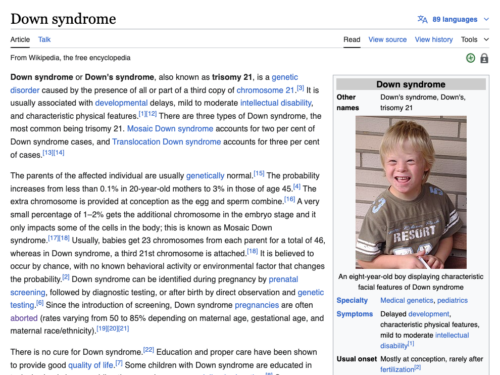There’s no question that Wikipedian Nabor Barbera’s professional expertise aligned perfectly with the goal of our recent Wiki Scientists course to improve medical information on Wikipedia. New to Wikipedia but with over 40 years of experience as an eye physician and surgeon, Barbera drew from his extensive knowledge to find and fill gaps in ophthalmology content throughout the six-week course sponsored by the WITH Foundation.
But it was a personal connection to the course’s focus on adult disabilities that propelled his work on Wikipedia – and led him to make substantive additions to an already well-developed, well-regarded article on the site.
“My sister has Down syndrome and I am involved in assisting with her medical care,” said Barbera. “I was interested and motivated to share what I knew through Wikipedia.”

Barbera added a new, robust section on ocular findings to the Down syndrome article, including information related to clinical signs of Down syndrome in an infant at birth, and the greater frequency of vision disorders such as congenital cataracts, strabismus, nystagmus, nasolacrimal duct obstruction, and refractive error among individuals with Down syndrome.
“Wikipedia is one of the best examples of the realization of the original promise of the internet – constructive collaboration and dissemination of knowledge,” explained the ophthalmologist when reflecting on the power of Wikipedia to shape awareness and understanding of topics like disabilities.
Throughout the course, Barbera also made enhancements to other eye-related articles, including Pseudostrabismus, which could lead to the incorrect diagnosis of strabismus. Pseudostrabismus, the false impression that the eyes are misaligned, generally occurs in infants and very young children, whose facial features are not yet fully developed.
“It was quite rewarding to look at the page view statistics with [our instructor] at the end of the course,” said Barbera. “It’s amazing how many views there were of the work in just a few weeks! It helps me understand how significant the contribution can be, and I am sure others would share that sense of satisfaction.”
Praising his WITH course and its instructor, Wiki Education’s Will Kent, Barbera underscored the quality of his learning experience, the value of Kent’s encouragement and feedback, and his thanks to the WITH Foundation for supporting healthcare for those with disabilities.
“One of the benefits of these courses is the fact that participants have an opportunity to learn from each other,” said Kent. “User Nabor Barbera led and fostered several useful conversations about disability topics, understanding the Wikipedia community, and exploring the useful (and sometimes baffling) user interface. These kinds of conversations embody the kind of drive, agency, and curiosity that make an engaged Wikipedian.”
While his course has officially ended, Barbera continues to review and edit Wikipedia articles, encouraging others to lend their own knowledge to improve the site for all.
Interested in learning how to add your expertise to Wikipedia? Explore Wiki Education’s upcoming courses for subject-area experts.
